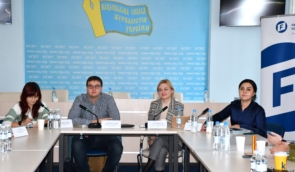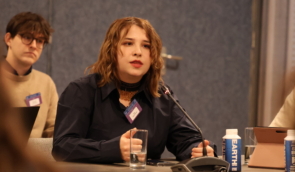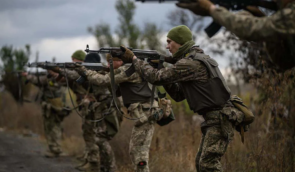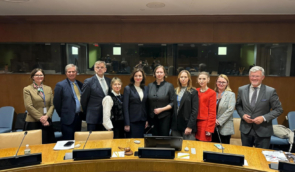“He wanted to commit suicide”: relatives of Kremlin political prisoners shared their stories with participants of Crimea Global conference
On November 19, as part of the international conference Crimea Global, delegates from Mexico, Brazil, Sudan and Iraq met with relatives of political prisoners unlawfully convicted in Russia. At the PEN Ukraine office, the participants sat at a long table to discuss the fate of people who have survived torture and are deprived of access to medical care and communication with their loved ones. This meeting was organised by Human Rights Centre ZMINA together with the Mission of the President of Ukraine in the Autonomous Republic of Crimea to make foreign human rights defenders and journalists aware of the horror of crimes against Ukrainian citizens in the occupation committed by Russia.
 Photo by Anastasiia Mantach
Photo by Anastasiia MantachOlha, the sister of 53-year-old political prisoner Mark Davydov, shared his story emotionally, unable to hold back her tears. Her brother, a teacher from Crimea, was detained by Russian security forces before the full-scale invasion, in 2019, when he was on his way to Turkey. He had photos on his phone from the events on Kyiv’s Independence Square during the 2014 Revolution of Dignity and correspondence with a leader of the Syrian opposition movement. This was enough for a Russian court to sentence him to 18 years in prison under the article “terrorism”.
“Mark was forced to confess with a bag over his head. Now he is already in the Ryazan region, serving his fifth year in prison,” Olha’s voice trembled.
 Olha, sister of Marko Davydov. Photo by Anastasiia Mantach
Olha, sister of Marko Davydov. Photo by Anastasiia MantachOleksandra Barkova, sister of Crimean artist and activist Bohdan Ziza, chimed in: “Each of us understands that there are no guarantees. There can only be torture, a harsh, cruel prison.” Oleksandra says that with great difficulty she managed to get a letter from her brother, who is awaiting the verdict of the occupation court on three charges at once. His “guilt” is that in 2022, he poured yellow and blue paint on the doors and facade of the Yevpatoria city administration building and threw a Molotov cocktail. Oleksandra read out a letter from her brother to the foreigners:
“Have you ever seen butterflies die?” – the pro-Ukrainian activist began his message with these words. And yet, despite the torture and abuse that Bohdan Ziza experienced, every line is imbued with support for Ukraine. “Wherever an “avtozak” (Russian prison van) takes me, the beauty of Crimea will always be in my heart… I believe it is better to be under Russian missiles than where they come from.“
 Valentyn Vyhivskyi’s parents. Photo by Anastasiia Mantach
Valentyn Vyhivskyi’s parents. Photo by Anastasiia MantachThe parents of Valentyn Vyhivskyi, who has been in captivity for the longest time of all the Kremlin’s prisoners – 10 years – shared their son’s story. A Russian court recognised him as a “spy” because he was a participant in the Euromaidan and the Revolution of Dignity and travelled to Crimea in September 2014 to attend an aviation exhibition because he was a plane enthusiast. For most of his ten-year imprisonment, the man was held in solitary confinement and the rest of the time – in a cell-type regime. “He wanted to commit suicide,” said Halyna, Valentyn Vyhivskyi’s mother. But, according to his parents, his psychological state has now improved – he hopes that after his release he will be able to return home.
Political prisoners who are citizens of Ukraine often lack access to basic necessities, such as medical care and medicines. The brother of Crimean Ali Mamutov, Fevzi, told the delegates of the Crimea Global conference: “My brother will soon be 48 years old, and he has chronic illnesses. Blocking access to medicines in Crimean prisons is a common story. We couldn’t even give him medicine for his headache.“
 Fevzi Mamutov. Photo by Anastasiia Mantach
Fevzi Mamutov. Photo by Anastasiia MantachTetiana Lukianenko, the sister of the wife of Rustem Huhuryk, detained in 2022 at the Chongar checkpoint and accused of participating in the Crimean Tatar partisan movement, said that her relative also currently has serious health problems and cannot receive qualified medical care.
“In detention, his health began to deteriorate rapidly. He was taken to a colony in Buryatia. He is in an overcrowded cell. He is constantly transferred to the solitary confinement unit, the last time he was there for 20 days. The Russian system is doing everything possible to break a person in detention. Rustem is an innocent man who has become a victim of the repressive system,” Tetiana said.
Viktoriia Nesterenko, Project Manager at ZMINA, summarised: “Currently, more than 60 Crimean political prisoners are not provided with medical care. We believe that the international community can draw attention to those prisoners who have health problems.“
 Viktoriia Nesterenko, ZMINA. Photo by Anastasiia Mantach
Viktoriia Nesterenko, ZMINA. Photo by Anastasiia MantachUriã Fancelli, a Brazilian Political Analyst and Journalist, asked how foreigners can help political prisoners from Ukraine in practice. In response, Petro, the father of Valentyn Vyhivskyi, who has been waiting for his relative’s release for the longest time among all those present, said: “If foreign journalists talk about our political prisoners, Russian “jailers” are afraid to touch them. This is at least some security for our people.“
 Hannia Novell (Mexico) and Natia Navruzov (Iraq). Photo by Anastasiia Mantach
Hannia Novell (Mexico) and Natia Navruzov (Iraq). Photo by Anastasiia MantachMexican Journalist Hannia Novell asked the relatives of repressed Ukrainians whether they are counting on a prisoner exchange.
Tetiana Lukianenko, the sister of the wife of political prisoner Rustem Huhuryk, bitterly noted: “There is no exchange of civilian prisoners. The exchange of prisoners of war is complicated, but it is at least possible. Ukraine does not take civilian hostages, so there is no exchange.“
Fevzi Mamutov chimed in: “Is it possible to put pressure on the government if there are prisoners of war? Probably not. But we need to unite and discuss this problem.“
On the same day, 19 November, the delegates of the Crimea Global conference visited the sites of executions and mass graves in Irpin, Bucha and Borodianka. They were shocked by the cruelty and meanness with which Russian troops acted in the Kyiv region in February-March 2022 and the number of crimes committed against civilians.
If you have found a spelling error, please, notify us by selecting that text and pressing Ctrl+Enter.















